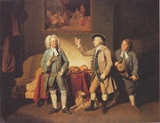
playwright
and Librettist.
Isaac John Bickerstaff was born in Dublin, on 26 September 1733, where his father John Bickerstaff held a government position overseeing the construction and management of sports fields including bowls
and tennis courts. The office was abolished in 1745 and he received a pension
from the government for the rest of his life.
In his early years Isaac was a page
to Lord Chesterfield
, the Lord Lieutenant of Ireland
which allowed him to mix with fashionable Dublin society.
Hope! thou nurse of young desire.![]()
There was a jolly miller once, Lived on the river Dee;He worked and sung from morn till night: No lark more blithe than he.![]()
And this the burden of his song Forever used to be,—I care for nobody, no, not I, If no one cares for me.![]()
Young fellows will be young fellows.![]()
By candle-light nobody would have taken you for above five-and-twenty.![]()
Fine feathers, they say, make fine birds.![]()
Ay, do despise me! I'm the prouder for it; I like to be despised.![]()
Perhaps it was right to dissemble your love,But - why did you kick me downstairs?![]()
Health is the greatest of all possessions; a pale cobbler is better than a sick king.![]()

